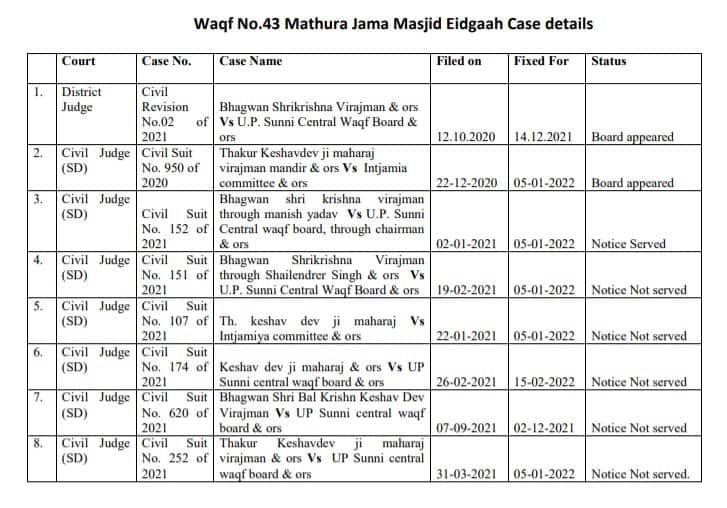
By Kulsum Mustafa
Krishna Janmabhoomi suit-Thakur Keshavdevji Maharaj and others (Petitioners) Vs. Intezamiya Committee and others (Opp Parties)
This is the civil suit, CASE NO. 950 OF 2020 filed on Dec 22, 2020 in Mathura in Uttar Pradesh that is giving sleepless nights to all peace-loving citizens of the country. The tension waves can be felt on the streets all over the country– on social media, in television debates, and most importantly among the masses.
The case was filed on behalf of deity Lord Krishna seeking the removal of the 17th century Shahi Idgah mosque, adjacent to the Shri Krishna temple complex in Mathura, and asking that 13.37-acre land be returned to the deity.
On 7th February 2021, the Mathura civil court admitted the plea of Thakur Keshavdevji Maharaj. The judge found the suit ‘maintainable’ and hence ‘admissible’ for a detailed hearing. Notices were issued to the president of the Sunni Waqf Board, Lucknow, and the managing trustees of Sri Krishna Janmabhumi Trust Katra Keshav Dev temple and Sri Krishna Seva Sansthan. In the last hearing, the date for revision was fixed for December 2, 2021, but due to the adjournment sought by the petitioners the next date is now fixed for December 14, 2021.

The call by the Hindu fundamentalist organization, led by the Akhil Bhartiya Hindu Maha Saba to install an idol of Lord Krishna in the Shahi Mosque mosque, from the nearby Lord Krishna temple in the Katra Keshav Dev temple complex in the city. The day chosen for this is 6th December- the day Babri Masjid was demolished in Ayodhya by the Kar sewaks.
The logic given is that the Mathura case is like Ayodhya and will be dealt with in the same way. The petitioners say the 2019 Supreme Court judgment on Ayodhya give their case legal teeth. But the Opposite parties disagree.
“This is far from the truth. The 2019 SC verdict on Ayodhya if applied in this case will only work out totally in our favor,” asserts Zufar Ahmad Faruqui, chairman, Sunni Waqf Board citing the example of the Parliament Act that came after this verdict
The Board contention in their preliminary reply is that Parliament enacted the Places of Worship (Special Provisions) Act 1991 which evinces the intent of Parliament in enacting the law.
The Board says in its application, “An Act to prohibit conversion of any place of worship and to provide for the maintenance of the religious character of any place of worship as it existed on the 15th day of August 1947, and for matters connected therewith or incidental thereto.”
Speaking to Siasat, Mr. Faruqi, said that the law has been enacted to fulfill two purposes. First, it prohibits the conversion of any place of worship. In doing so, it speaks to the future by mandating that the character of a place of public worship shall not be altered. Second, the law seeks to impose a positive obligation to maintain the religious character of every place of worship as it existed on 15 August 1947 when India achieved independence from colonial rule.
Considering that Uttar Pradesh goes for assembly elections in just a few months’ time, the move for polarizing the majority community through this Hindutva agenda is an obvious game plan and one that the leaders of the saffron brigade are not shying away from accepting.
“What wrong are we doing? We had made our stance clear right after we won the Ayodhya case. Mathura and Kashi were on our agenda right from the beginning,” says a BJP leader supporting the stand of the deputy chief minister Keshav Prasad Mauriya who had publically announced that as Ayodhya temple is being constructed they are preparing for Mathura and Kaashi.
Mathura has held religious significance since the 6th century BC. According to tradition, a temple for Krishna was built by his great-grandson Vajranabh. Mughal Emperor ‘Aurangzeb attacked Mathura and destroyed the Keshavdeva temple in 1670 and built the Shahi Eidgah in its place.
Legend has it that Krishna was born to Devaki and Vasudeva in a prison cell where they were confined by his maternal uncle Kansa, the king of Mathura, due to a prophecy that he will be killed by the offspring of his sister Devaki.

